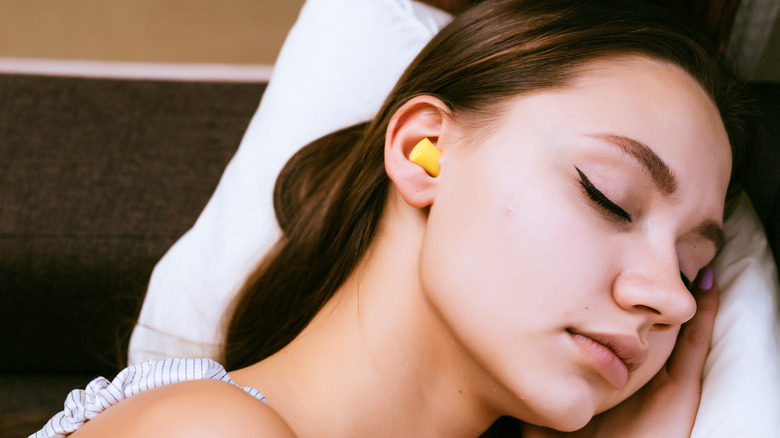This Is What Happens When You Use Earplugs Every Night
Getting a good night's sleep has a great number of health benefits — from getting sick less often to heightened productivity and less stress (via Medical News Today). According to a report by the Institute of Medicine Committee on Sleep Medicine and Research, low-quality sleep can increase the risk of "hypertension [high blood pressure], diabetes, obesity, depression, heart attack, and stroke." No wonder experts strongly recommend seven to nine hours of quality sleep per night.
Unfortunately, loud noises and your environment can sometimes disrupt your much-needed shut-eye. In turn, many people use earplugs to maintain the quality of their sleep. Whether it is because your room faces a busy street, your partner snores, or you're just a light sleeper, earplugs have been a savior.
The question is, though, what are the ramifications of wearing earplugs every night? Do the benefits outweigh the possible drawbacks? As with anything, weighing the pros and cons can help you come to an informed decision. Thus it is important to look at what happens with consistent use and decide if uninterrupted, quiet slumber is worth it.
The dangers of wearing earplugs
A 2014 study in the Iranian Journal of Nursing and Midwifery Research shows that, overall, earplugs are a safe and affordable way to improve the quality of sleep. However, there are some drawbacks.
Ear wax buildup can occur, which can lead to tinnitus, trouble hearing, and ear infections, according to Healthline. For most people, though, earplugs provide more pros than cons — as long as you use them properly. Neurotologist Elina Kari told Livestrong, "Earplugs are only meant to fit in the first third of the canal. You should always be able to grab your earplug with two fingers." Additionally, otolaryngologist Robert del Junco told the site, "Your hands should be washed and dried before inserting earplugs to prevent the risk of infection."
You should also clean your earplugs on a regular basis to get rid of bacteria and replace them when needed (via Healthline).


